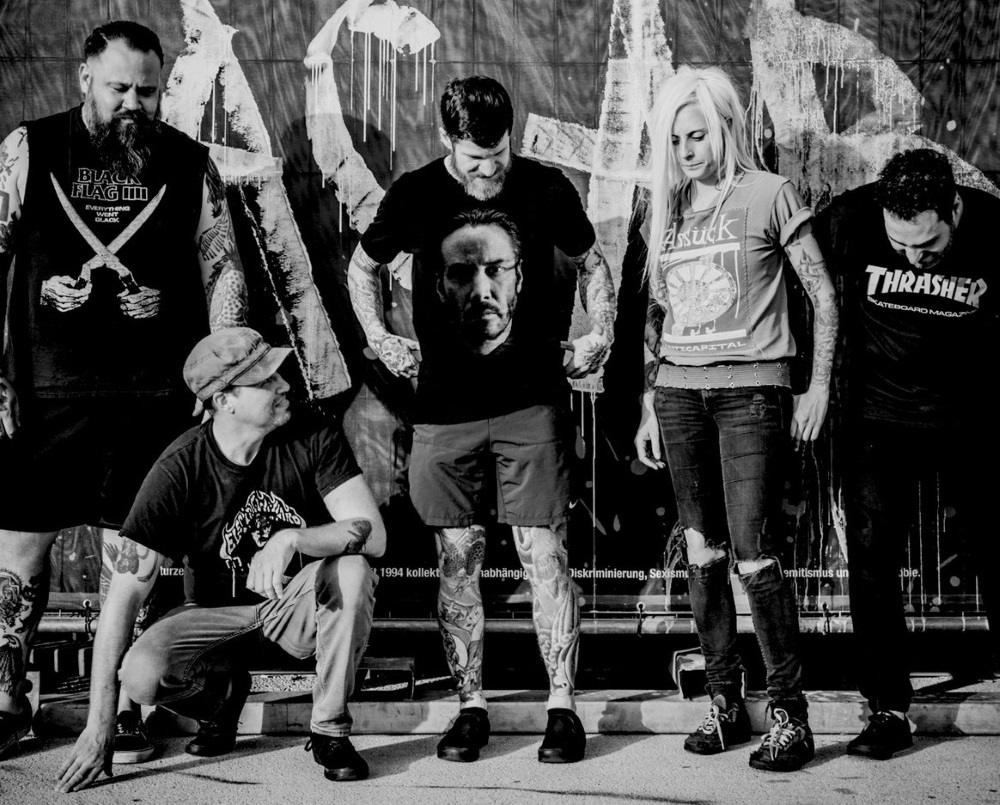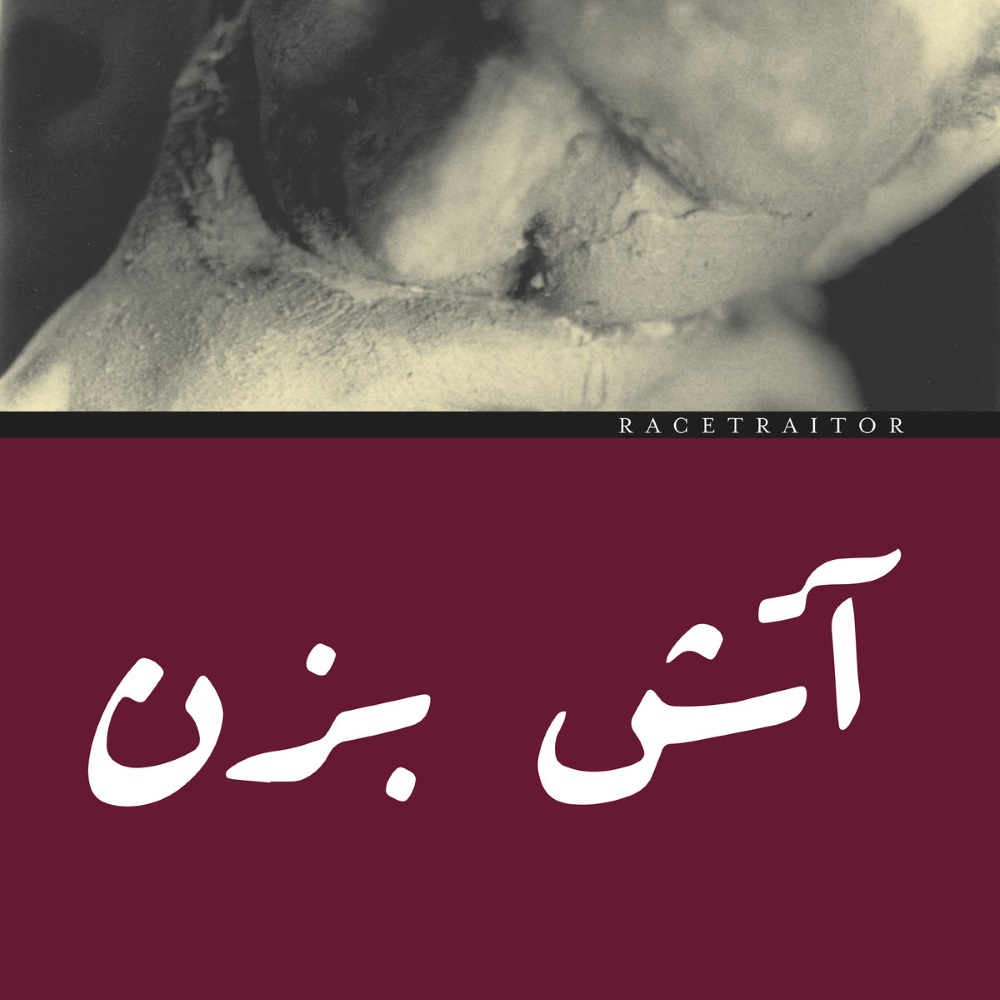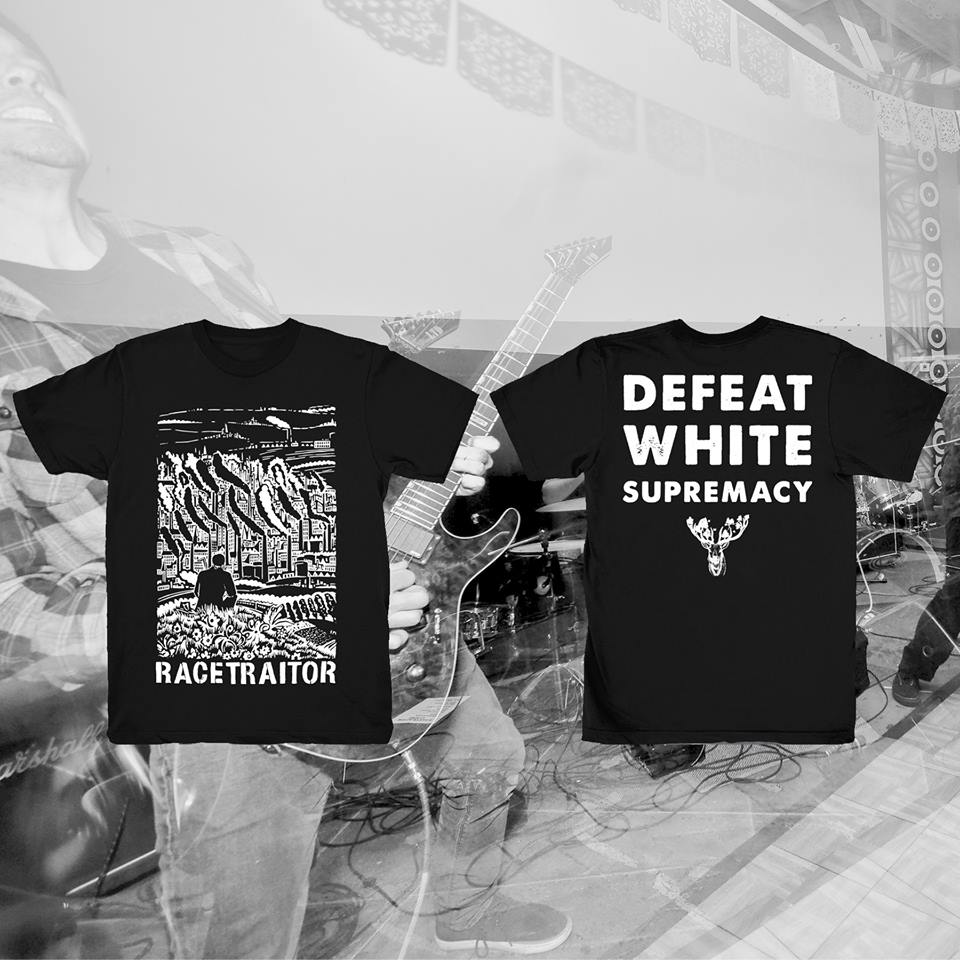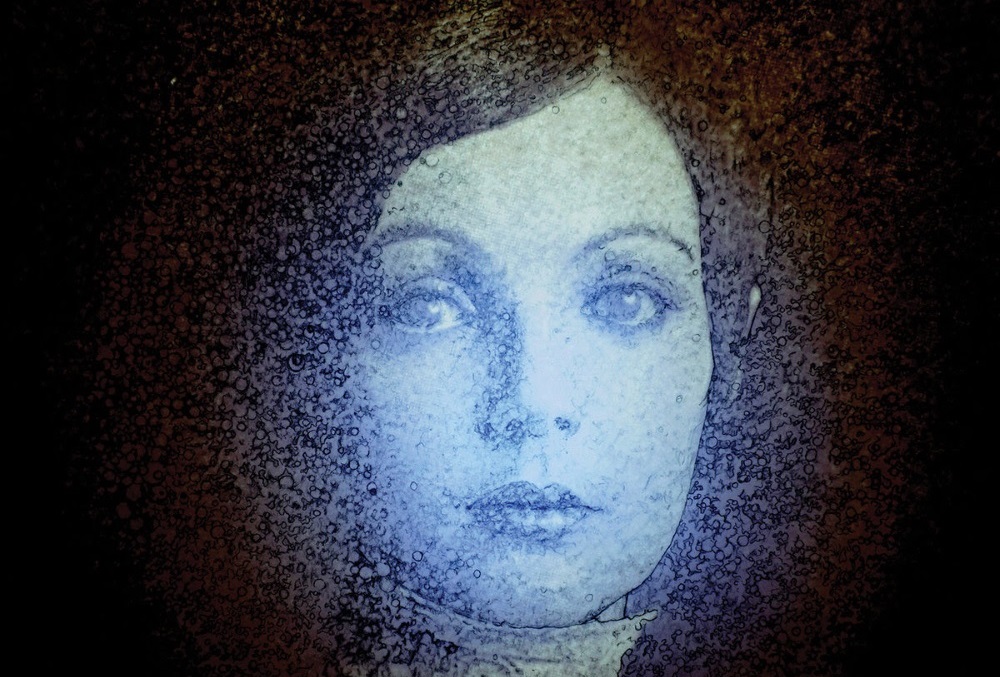A couple of months after the Ugly & Proud Records’ announcement of the second press of 1998 classic “Burn The Idol of The White Messiah” by Chicago political straight edge hardcore pack RACETRAITOR, the band is back with even more excting news – their first full length in 20 years called 2042, slated for an October 12th release via Good Fight Music. Packed with their gloomy, metallic, grindy and powerviolent sound, the record is being teased with a new single called “BLK XMAS”, premiered earlier this week on Revolver Mag, who aptly commented:
The song is a pure strain of viciousness, weaving in moments of uncomfortable melody that immediately give way for pummeling riffs, and a pounding use of drums courtesy of Andy Hurley (Fall Out Boy, SECT). The video catalogs brutality through the ages, from images of skulls of the past, to footage of race riots of the 1950s.
To celebrate, we have teamed up with the band to go back in time and revisit their highly influential 1998 debut “Burn The Idol of the White Messiah” and give you a special first-hand commentary for each and every track! You can find it below.
“Burn The Idol of the White Messiah” was originally released by Uprising back in 1998. The LP has been re-mixed by Dallas Thomas (Asschapel, Pelican) and remastered by Brad Boatright (Nails, Obituary, Iron Reagan, Gatekeeper). The first press on Carry The Weight Records from the UK is now long sold out and the band teamed up with U&P and a yet to be revealed US label for the second repress of this record. The new pressing of ‘Burn The Idol…’ sounds heavier and darker than ever while remaining totally true to the original. The LP includes a special zine containing the history of the band.
Back in the 90s RACETRAITOR was one of the most controversial political bands of the 1990s hardcore scene. It made it to the covers of both Maximumrocknroll and HeartattaCk before recording a single track. The name RACETRAITOR was in reference to using one’s social and economic privilege to create a more egalitarian world. The idea was to take the pejorative term “race traitor” used by white American racists and claim it as a positive self-chosen label. The band is known for aggressively challenging audiences to confront the ways they might help perpetuate or buy into racist and exploitative social and economic systems. Many of their shows turned into heated arguments and Racetraitor were quick to become one of the most talked about political hardcore bands of their time.
“BLK XMAS is really about how absurd it is that people, like the Fox News crowd, try to insist that Jesus or even fictional characters like Santa Clause are white,” says vocalist Mani Mostofi. “On one hand it is totally absurd and laughable but on the other hand, it goes hand and glove with the type of racist and xenophobic sense of cultural purity that gives rise to something like Trump.
“Whether it is ‘Fear of a Black Planet’ or ‘Fear of a Spanish speaking America,’ it’s all propaganda designed to get white people to follow a political line that barely benefits most of them beyond a false sense of superiority.”
Drummer Andrew Hurley comments
“With all that is going on in the world, we are trying to make a record that pulls no punches in the music or the message. We want to inspire punks, hardcore kids, and metalheads and maybe piss off a few racists along the way.
The name of the record refers to the date the US is predicted to become a majority-minority country. ‘2042‘ explores different sides of the racist fear and the far right attack on the concept of a majority-minority America. It hits on everything from Trump, the far right media, to xenophobia and Islamophobia.”
2042 features the full lineup that recorded Burn The Idol of the White Messiah, (Mani Mostofi, R. Brent Decker, Dan Binaei and Andy Hurley of Fall Out Boy and Sect). It also includes the addition of Andrea Black from the now defunct metal act Howl.
“Burn the Idol of the White Messiah”
« album & track by track commentary by Mani Mostofi »
MM: We are pretty stoked to do the second press of the Burn the Idol with Good Fight and Ugly and Proud. The first press on Carry the Weight Records did really well and we felt there was still demand out there for it. Kinda shocking.
We have come to realize the record seems to have survived as a cult album. Not a lot of people have heard it, it is not for everyone, but in each town there are a few people that appreciate the record and those people deeply appreciate it. I saw a review of the record that said Burn the Idol was a “difficult” listen and intentionally so. That was meant as a positive review. (LOL) That’s a pretty fair. There is no pop song on there, even by hardcore pop standards. With some hind sight I see the record more objectively, it is brooding, mean, disjointed and thematically trickey. All in ways that we like. It is not avant garde nor is it straightforward. So you either get it and love it or think the record the subject of ridicule. We’re cool with that.
The title of the record is part of the convoluted presentation: long and weird. Bold or trying too hard, take your pick. The “white messiah” was a reference to the idea of a white Jesus as a tool of white power and European colonialism but it was also about the post-colonial idea of Western-led globalization. There was such a rush to adopt neoliberalism as a savoir in the 90s. That seems to be impolding these days. We have never been anti-globalization or cultural relativists. We do not believe in nationalism and isolation. But we are against a globalization based on dominance and exploitation. We just believe in globalizing the aspect of each culture or tradition that minimizes oppression and promotes the dignity of all people and life.
Curse
MM: Curse is by far the most popular song on the Burn the Idol. Funny thing is it almost was not on the record.
We were going to record with Brian Griffin, who played in a big Chicago death metal band Broken Hope, which we loved. But one thing lead to another and we cut the session short and we ended up recording at the Blue Iguana, which was a pretty important pop punk studio but few hardcore bands like Birthright also recorded there. There was about a month break between recording sessions and Dan wrote Curse and the rest is vegan metal history.
Lyrically, it is one for two songs Brent our bass player wrote all the lyrics. It is sorta thematically out of place from the rest of the record also. All the other songs touch on anti-colonialism, anti-white power, or revolutionary struggle in some way. Curse is about child sexual abuse and the pain it causes. Brent had seen a lot of sexual abuse of minors around him growing up in school, sports, and church, he saw some his friends and teammates victimized. So it was pretty personal to him.
It was a hard lyric to sing because it was so personal to him. I had minimal context for it in my life. Sure we are all generally disgusted by sexual abuse of kids but for me it was important to make the anger in the song my own. I focused the idea child abuse more generally, which I understood, and the rage of wanting to send the perpetrator to hell. The “dragged by your face” line was about dragging the abuser to hell, at least in my reading of it. And the cover of the record is suppose to invoke that idea. In that way the song fit with the rest of the record, it became about abuse of power and struggle against the abuser.
People often comment on the opening scream. That was 100% an idea taken from Pantera. Of course political we differ from Phil (LoL).
Lyrics:
You don’t own him…teeth in this corpse…builds a dying monument…flesh and earth cursed innocent and black…raped with tongues of steel and glass…how could you fucking touch him?…torn from the ashes to be…dragged by your face
Dar Al-Harb
MM: Dar was on our demo and then got rewritten when Andy joined the band. The song was completely constructed to match Andy’s drumming ability and is still sorta our gold standard. The first time I heard Andy play, it was this song. I started to laugh at how good it sounded.
Lyrically it is about the colonization of Palestine and Western support for it. It is about the tragedy mixing European nation-state colonialism with religious manifest destiny and calling it a national liberation movement.
I always look at Zionism as a key lesson of history: liberation that simply come from assuming the role and style of the powerful is often an unjust liberation. When I started reading about Zionism as an ideology and historical movement I thought to myself “I am Zionist” because I supported national liberation movements and who needed liberation more than the European Jews. But as I read on I realized that this was a very dangerous version of “national liberation”. I saw how Zionism tried to adopt the political frameworks of the European nation state and settler colony. And it did not played out well.
At the time I wrote these lyrics I was living in a far left bubble and did not fully realize how controversial criticism of Israel could be. Maybe I should have know because I can’t think of any punk band back then singing about the issue outside of Propagandhi and even they framed it as an anti-religion song which is easier for punks to digest. So on the few occasions people at shows confronted us about that position we were a bit surprised.
About 12 years later, I am working at a major human rights NGO. The organization was in the middle a massive public relations crisis resulting from its criticism of Israel. My boss called me into her office and asked about my old bands, which I hadn’t actually told anyone about. I actually had to submit my lyrics to Dar for examination by the upper management and communication department to see if my lyrics could be considered fair and defendable criticism. Which apparently they were because I was not let go (hahaha).
Lyrics:
White rain falls across the walls of new Jerusalem…to the ashes of disbelief…cry your filthy lie…venomous embodiment of wrath and hate…the star burns bright scorching the land clear for repopulation….repopulation…swallows whole…your Zion crushes whole…caging every life for the devil’s prize…country gutted out…nailed through the foot…christened in power…the beast’s power….the beast’s power
Path to Misery
MM: Musically Path is bringing together our love for Meshuggah, Man is the Bastard, and the pre-Earth Crisis band Gatekeeper. Not sure no other song in history can cite those three influences at once (lol). I can’t think of any hardcore bands incorporating a Meshuggah influence in 96/97 either. I remember Carl Severson (Good Fight Music, Ferret Records, and Nora) telling me at the time we were one of the few bands with drummer that could play a Meshuggah-like part to it is funny he is re-issuing the record all these years later.
I have gotten a lot of positive feedback on these lyrics over the years. Path really is the central thesis of the band. America is a settler colony built on genocide and slavery. So the theft of land, labor, bodies, culture, history, and more. That power dynamic persistes in the form of institutionalized white power and white privilege. It is also meant to be about European colonialism globally. Ultimately these systems dehumanize everyone and if you are on the receiving end of the power structure you can choose humanity, yours and of others, over a culture of violence and dominance. The lyrics are pretty abstract but people seem to get them.
Lyrics:
Born with no soul of your own so you dig for bones in the graves of those you’ve enslaved and massacred….bronze your horns and hooves with blood and sacrifice…collapse at the altar of your barren life…frail and yellow…your spine twists downward from shame and the weight of your arrogance…carry the whisper that we are nothing more than stolen bones…and the blistered tongues of the dead carry the whisper…awake to a bleached destiny of sorrow…do you hear the voices escaping from the tongues that your hand cut out….the bell that summons you to surrender prayer is the bell that summons you to kill…in the end your own savagery has left you with nothing…and you’re the one left out to die
Continued below…
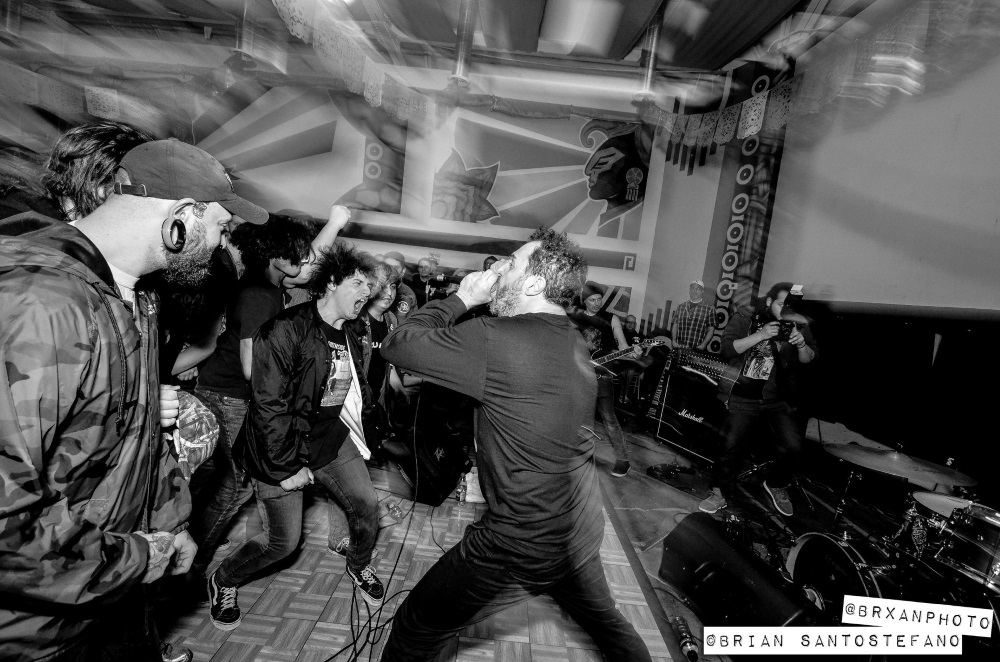
The Rise
MM: The song starts with that long intro that was pretty inspired by Bolt Thrower. I feel this song has some of our best riffs but did not get captured as nicely as some of the other tracks.
I wrote the Rise about the so-called war on drugs and war on crime as a method of social control. This song completely reflected the era in which it was written in but reads just as true today. It is no coincidence that the wars on drugs and crime were initiated by the Nixon administration immediately after the successes of the civil rights movement in the US. John Ehrlichman, Nixon’s policy advisors, admitted that was the plan was to criminalizing being black through the proxy of drugs and using that criminalization to arrest leaders, raid homes, break up organizations, all that. That is exactly what happened. It was really about destroying a community on the rise.
Then you have generations of young black men taken from their communities and families, caged for non-violent offenses. All the while allowing drug use in those communities grow essentially unchecked, while the so-called war on drugs didn’t do anything to actually tackle addiction and public health in those communities. And really the communities have been gutted and crippled and that was the point.
In 1996 when we wrote the song ‘crime’ and ‘gangs’ were a top political concern. It really drove white voters in particular. Bill Clinton had just signed his Crime Bill which only accelerated mass-incarceration and harsher sentences nationwide was the trend. Very few people back then were listening to the black activists and community leaders warning about the misguidedness and immorality of the wars and drugs and crime. Now after basically 50 years of violence and racist social engineering the absurdity of the endeavor is starting to be realized, after million of lives have been ruined.
Lyrics:
Stand up…do you hear the songs of redemption coughed out from blackened lungs?…as the bitter martyred voices harvest the songs to ruins…ruins…pump the veins with blood and demons…to breed havoc baptized in venom…the screams turn to whispers and we forget it…do you see the streets turn cold and red?…as millions of swollen hands are unable to close or clinch…in a cycle of filth the rewards are reaped in ruins…ruins…and now we’re safe…with blood in our own mouths…swallowed in faith…spit it out…the fear soaks in…pointing the way to the horizon…do we choke on our sins?
Suffocation
MM: The song is named after the band Suffocation, that inspired the main riff. It was one of those working titles that just ended up sticking. Our new guitar player Andrea Black actually drove Suffocation on tour recently and told them we had a song named after them. I think they were polite about it. (HAHAHA).
These are the lyrics I have the most mixed feelings about today, not sure if they are really reflect the nuance in my current opinion. The song is a criticism of pacifism as an ideology. We had a few pacifists punk friends at the time that really rejected perceived militant political movements like the Black Panthers. The song responds that stance benefits the oppressor and robs the oppressed the right to self defense.
I do think armed self defense might be necessary in some contexts, I think we need to remember that our goal or ideal is a society with no violence, or at least minimal violence: physical and economic. That ideal should always be front and center. It should guide all our thinking.
Violence is only a tactic and one that is far from ideal. It can maybe be adopted for revolutionary change and community defense but should not be at the center of what a movement is about. We need to learn from history and see how and when violence has been successful and when it leads to more oppressive forms of governments, when it was a distraction, and when it lead to defeat.
Lyrics:
These academies packed full ready to kill for the throne…in drone…gouging at any voice of fist raised to piercing…state stands…in death of the defense…the resistance falls in flock…for your ideal…power feeds…brokering the means of survival and liberty…when the soot falls down from the sky and hope breaks lose…are you numbed by the blade being pointed at you?
Broken Dust
I think it is one of the most interesting and musically progressive songs we ever wrote. Not sure if anyone outside of the band agrees. The lyrics were a collaboration. Brent wrote the first few lines and the end. I wrote the stuff in the middle. We were just in sync with the idea we have never discussed the lyrics or their meaning but it came out cohesive. At the time, everyone in the band was trying to become something bigger than themselves. And that some was about the idea of becoming the new man or new woman. It was sorta radical leftist ideas meets Sufism. The lyrics were about seeking truth, destroying ego, rejecting consumption, being forged into something revolutionary through by trials and struggle.
There is a whole reference to Jonah from the bible and about him being reborn and stronger coming out of the whale. I was also using the whale to point to the phrase “inside the belly of the beast” which Jose Marti, an early cuban revolutionary thinker, used to refer his time in the US. Similarly, I was talking about being shaped by cruelty of American history and empire.
Lyrics:
Broken dust falls from our hands to the grasp of eternity…eat it all till nothings left to consume but your own flesh…and from the birth of Jonah…ninety-nine names carved into hands of clay carry our liberation
Cast You Down
This is our tribute to Deicide with a big singalong ending.
Brent spent a lot of time in Latin America in the late 80s early 90s. At a time when US sponsored death squads laying waste and activists were disappeared. In Guatemala this was a genocidal project. Part of US backed authoritarians was a growth of Catholic Liberation theology. The resistance was not just Marxists paramilitaries but there were many as Bishops, like Oscar Romero, and priests that were standing up for the poor and indigenous. The institution of the Church and the Jesus parable made for very effective organizing. So there was violence pointed at these Catholic leaders and communities. There was also an emphasis on promoting Christianity to divide communities and weaken the appeal of Catholic Liberation theology. Brent saw much of this first hand and wrote about it.
Lyrics:
Temples adorned with charred and suffocated bodies that lay upon the ruins of broken hopes…split tongues of the white prophets of a new order…as millions of swollen, naked bodies left to rot in the sun…hang them from their white crosses…rip their throats out…and make them remember…the cries for forgiveness that echo down these empty, scared hallways…i cast you down with the strength of god



